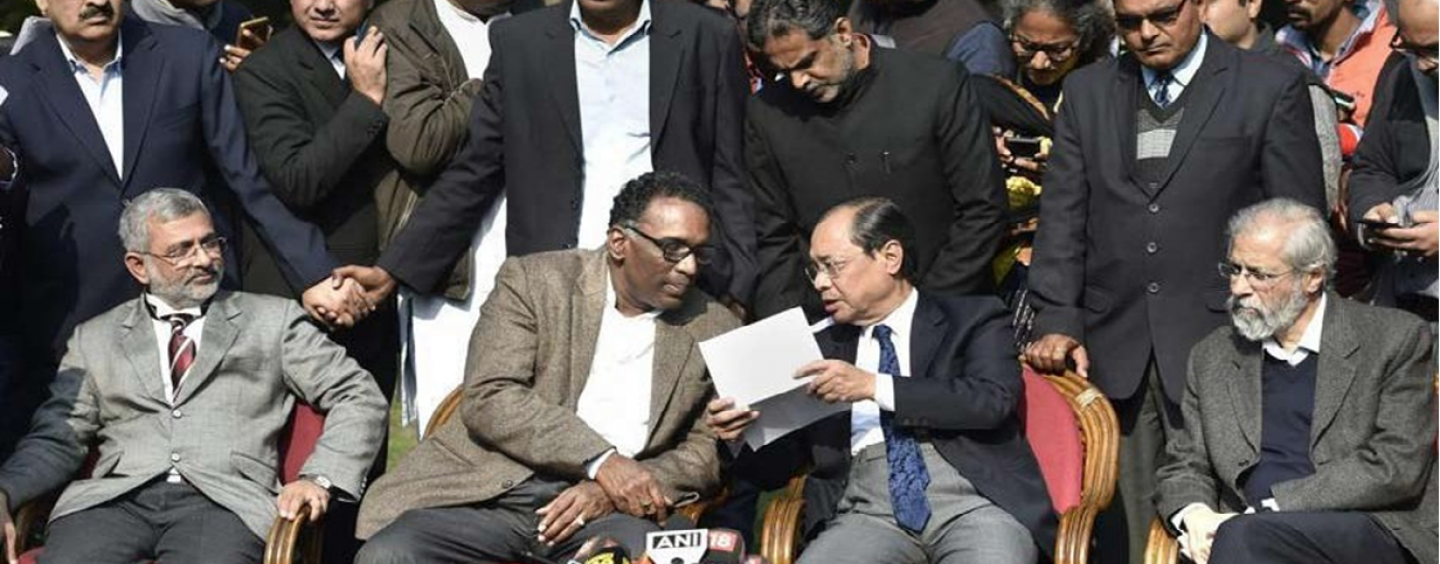India’s Supreme Court judges warn democracy is in danger
In a stunning move, four of the senior-most judges of India’s Supreme Court have publicly slammed the functioning of the country’s top court and warned that democracy will not survive without an independent judiciary.
Four senior judges of India’s Supreme Court have complained publicly about the way the court is being run and cases are assigned. They accused Chief Justice Dipak Misra of ignoring their suggestions to take remedial measures.
In a press conference on 12 Jan 2018, the first of its kind to be held by sitting Supreme Court judges, Justices Jasti Chelameswar, Ranjan Gogoi, Madan Lokur and Kurian Joseph alleged selective assignment of important cases to benches by Chief Justice Misra.
The judges’ move highlights the widening rift in the upper echelons of the country’s judiciary. The press conference was held at the house of Justice Chelameswar, who is lower in seniority only to the chief justice of India
The judges’ move highlights the widening rift in the upper echelons of the country’s judiciary. The press conference was held at the house of Justice Chelameswar, who is lower in seniority only to the chief justice of India.
“This is an extraordinary event in the history of any nation, more particularly this nation, and an extraordinary event in the institution of judiciary,” Justice Chelameswar told reporters.
‘This is an extraordinary event in the history of any nation, more particularly this nation, and an extraordinary event in the institution of judiciary,’ said Justice Chelameswar.

“It is with no pleasure that we are compelled to call this press conference. But sometimes administration of the Supreme Court is not in order, and many things which are less than desirable have happened in the last few months,” Chelameswar said. “Democracy cannot survive without an independent judiciary,” the judge added. “We tried to collectively persuade the chief justice of India that certain things are not right and remedial measures need to be taken, but unfortunately we failed.” Misra, who took over as chief justice in August 2017, has yet to comment on the allegations. In a letter to Chief Justice Misra that has been made public, the judges said they “are not mentioning details only to avoid embarrassing the institution.”
R.S. Sodhi, a retired Supreme Court justice, was quoted by The Associated Press news agency as saying that the judges’ decision to express their grievances openly was appalling. He said they should have sought redress within the system.
Mixed Reactions
observers say it was unprecedented for Indian judges to publicly criticize the head of the country’s highest court. The action drew mixed reactions, with some praising the four judges and others condemning them.
R.S. Sodhi, a retired Supreme Court justice, was quoted by The Associated Press news agency as saying that the judges’ decision to express their grievances openly was appalling. He said they should have sought redress within the system.
Former solicitor general of India N Santosh Hegde said he was “devastated” by their action which has caused “irrep- arable” damage to the institution. “As a retired judge of the Supreme Court, I feel devastated. “For some reason or the other, their cause is justified, (but) relief they are seeking is wrong…going to the media? No. Judiciary was always considered as a family. Family disputes are never taken to the streets,” Hegde told the Press Trust of India news agency.

But Supreme Court advocate Indira Jaising described the press conference as “historic.”
“I think we, the people of India, have a right to know what is going on within the judiciary and I welcome this,” she said.
Former Law Minister Hansraj Bharadwaj said the allegations made by the judges are a loss of prestige for the entire institution. “If you lose public’s trust, what remains?” Bharadwaj told the Indian news agency, ANI. “Judiciary must remain the pillar of democracy. It is the responsibility of the law minister to see how it functions.”
The opposition Congress party also chimed in, tweeting: “We are very concerned to hear four judges of the Supreme Court expressed concerns about the functioning of the Supreme Court.” Senior politician and Bharatiya Janata Party leader Yashwant Sinha said on Twitter that he stood firmly with the four judges. “Seen some of the comments. Stand firmly with the four judges. Instead of criticising them, let us concentrate on the issues raised by them. If the highest court is compromised then democracy is in peril,” he wrote.
Prime Minister Narendra Modi’s government, especially the law minis- try, was guarded in its reaction, view- ing it as “an internal matter of the judiciary.”
Influential and slow
India’s Supreme Court is the highest judicial forum and the final court of appeals in the country. It currently comprises the chief justice and 24 other senior judges, with six vacancies.
The institution wields enormous influence in the South Asian nation and has in the past revoked laws passed by the parliament that it regarded as in- fringing upon citizens’ rights.
The four senior justices, along with the CJI, are part of the Supreme Court collegium that selects judges to the apex court and high courts.
The controversy comes at a time when Indian judiciary is already struggling with its reputation for being a snail-paced justice delivery system, with a huge backlog of pending cases.
It’s estimated that about 30 million cases are pending in various courts across the country.
The government and judiciary in India need to focus on delivering justice to its citizen and restore credibility of the institution that is vital for the survival of democracy in India. The individual judge has limited value in the entire eco system so the present battle of top judges must be ignored and the focus must shift back to address the larger institutional issues at the earliest.
(Writer is Editor of Opinion Express and regular columnist to The Pioneer)








 OpinionExpress.In
OpinionExpress.In















Comments (0)